
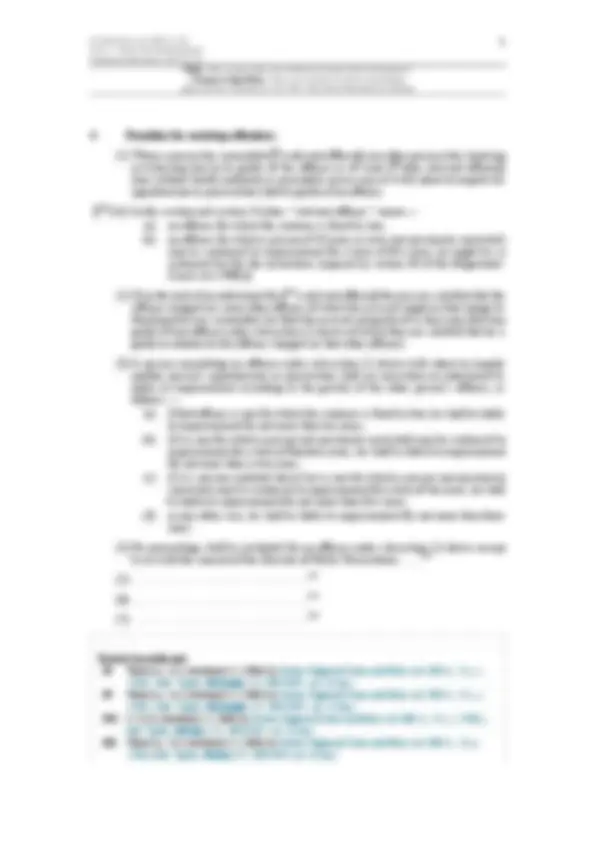
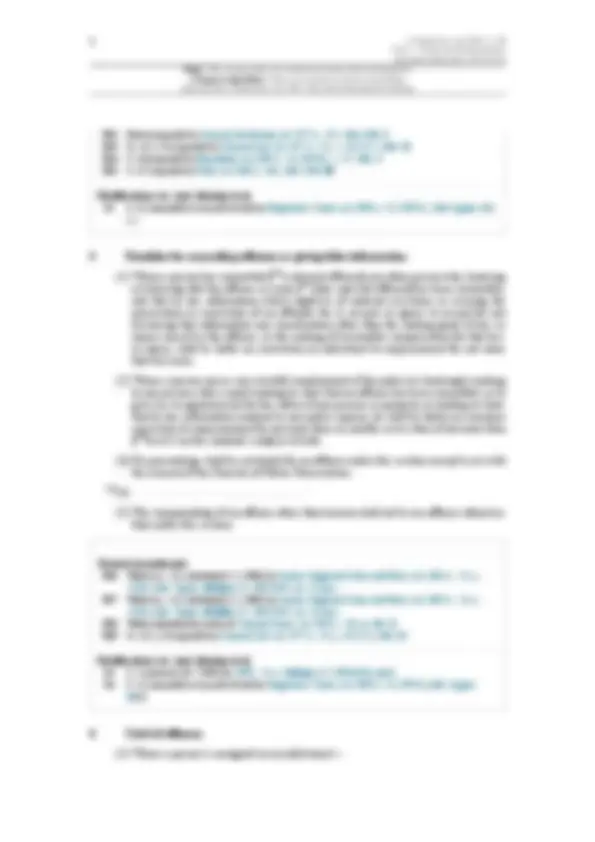
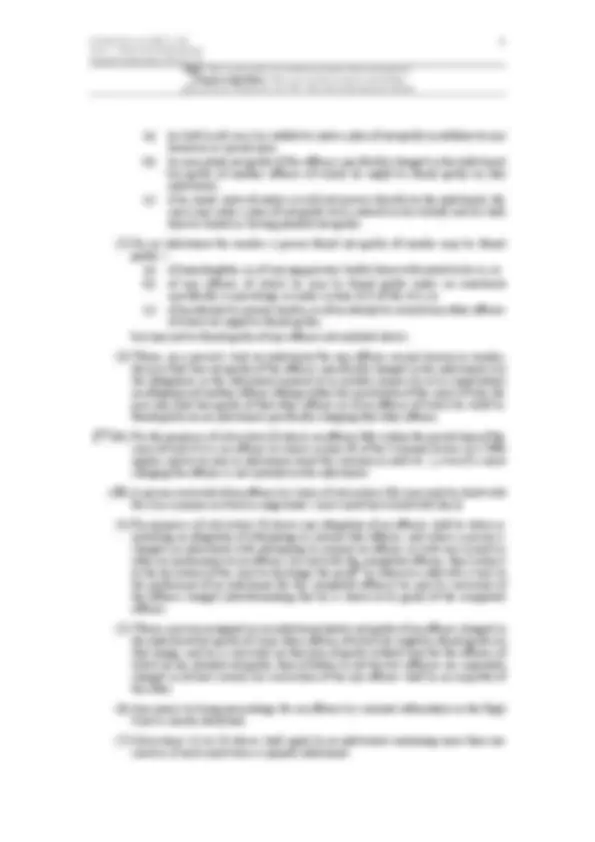
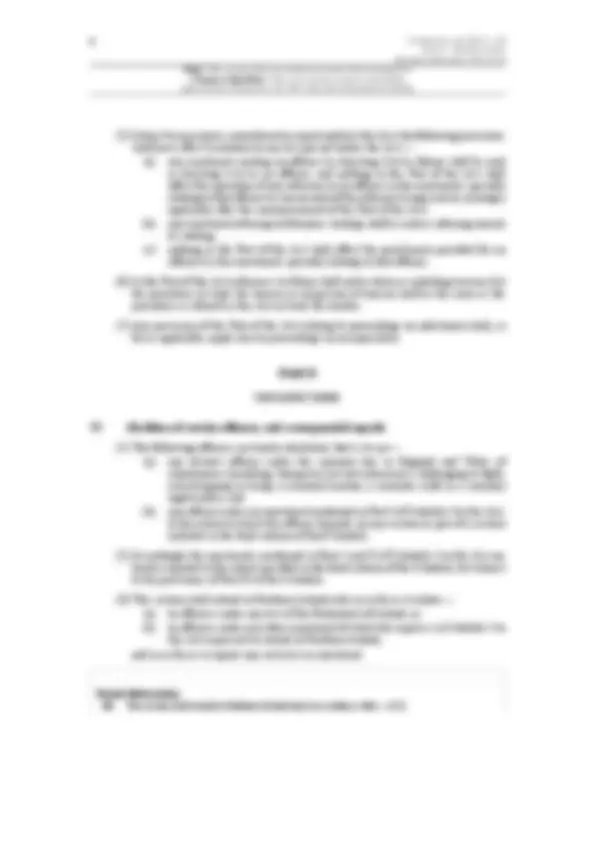
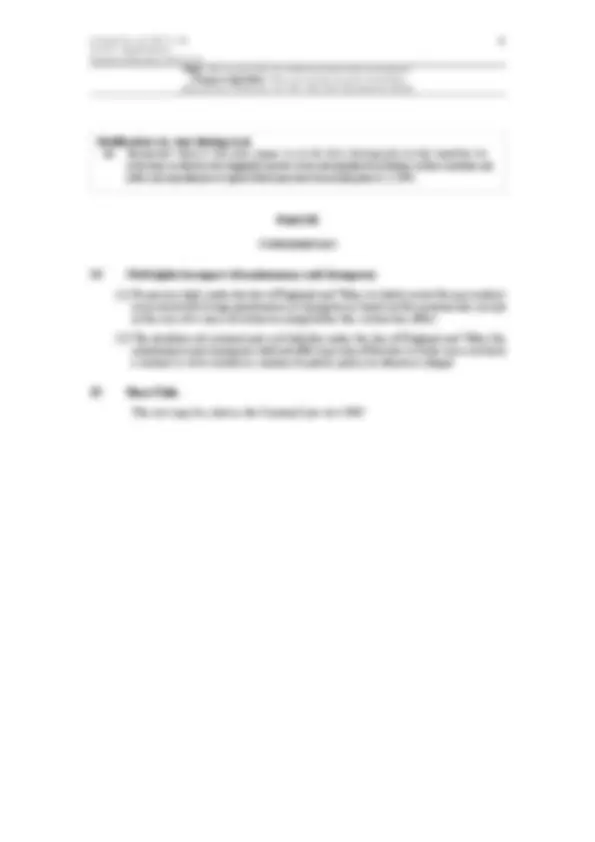
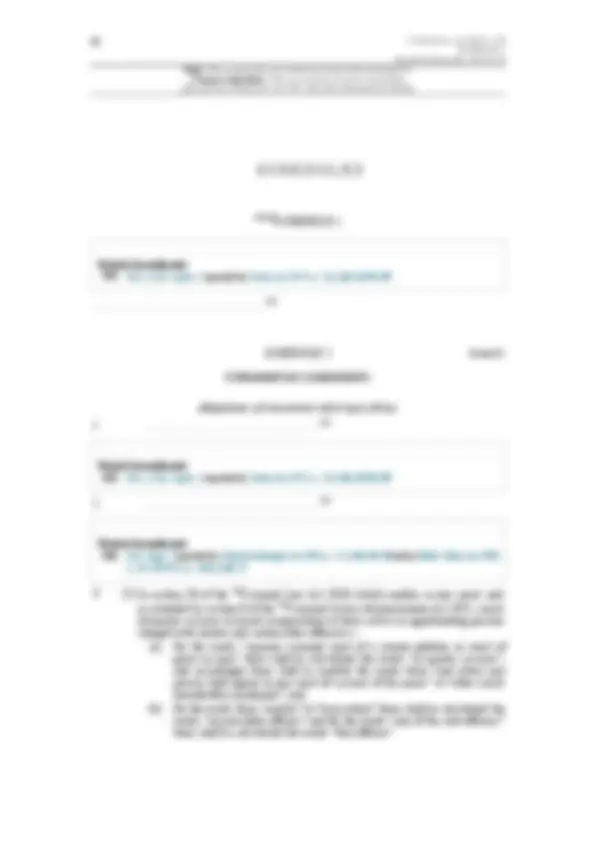



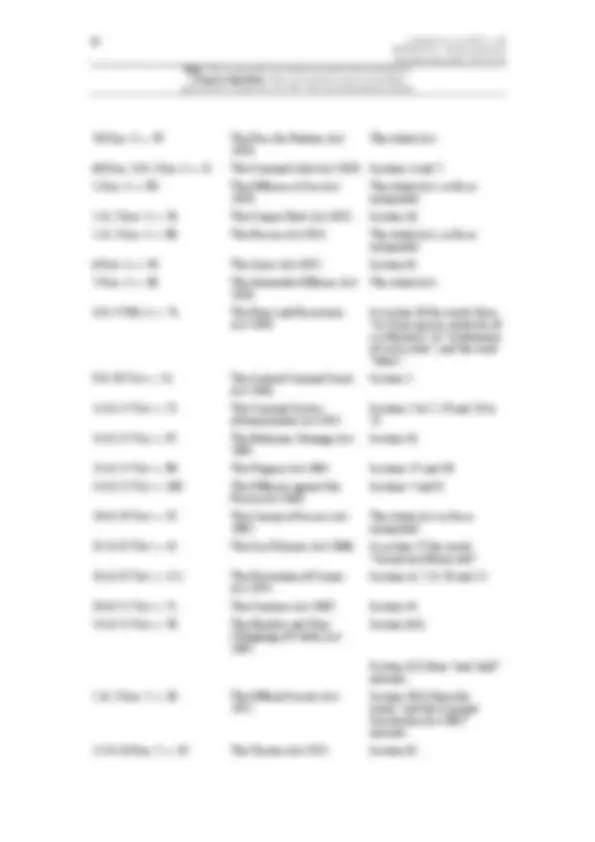

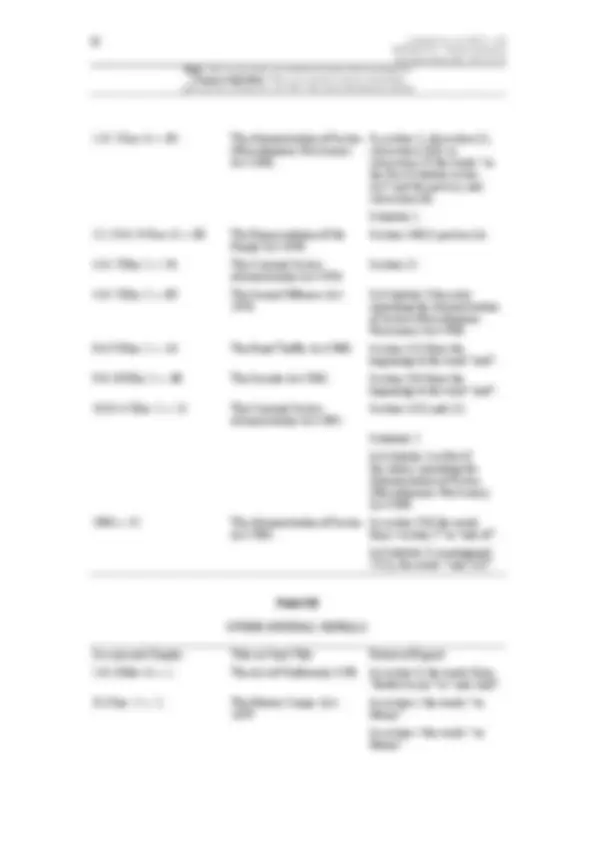
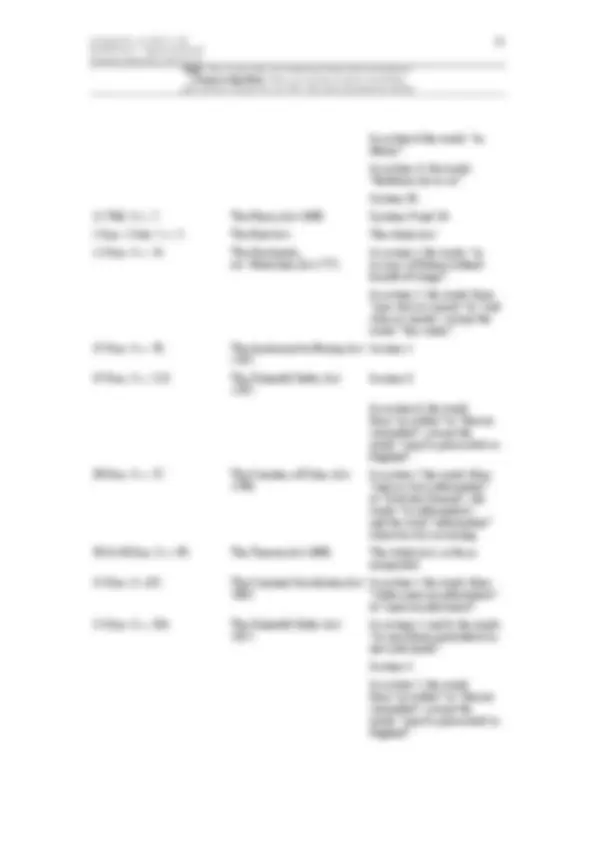
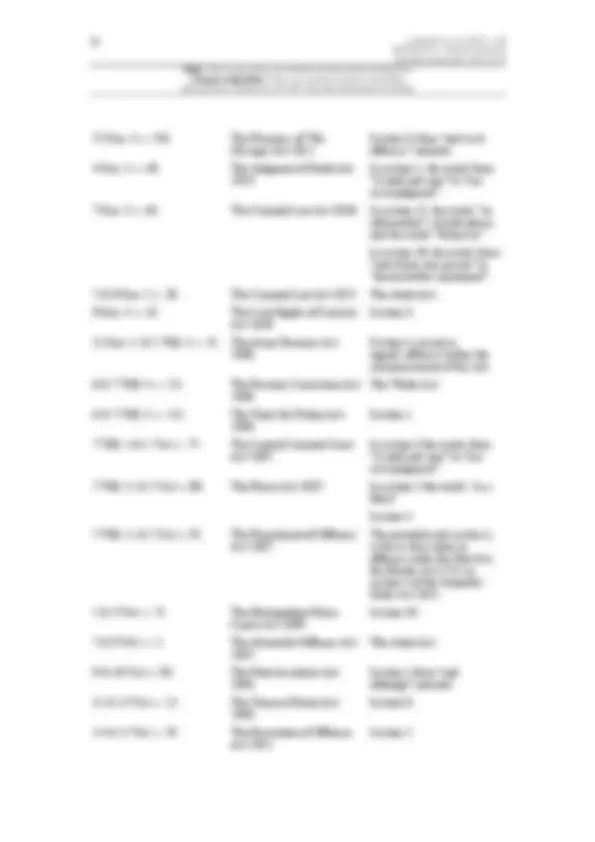
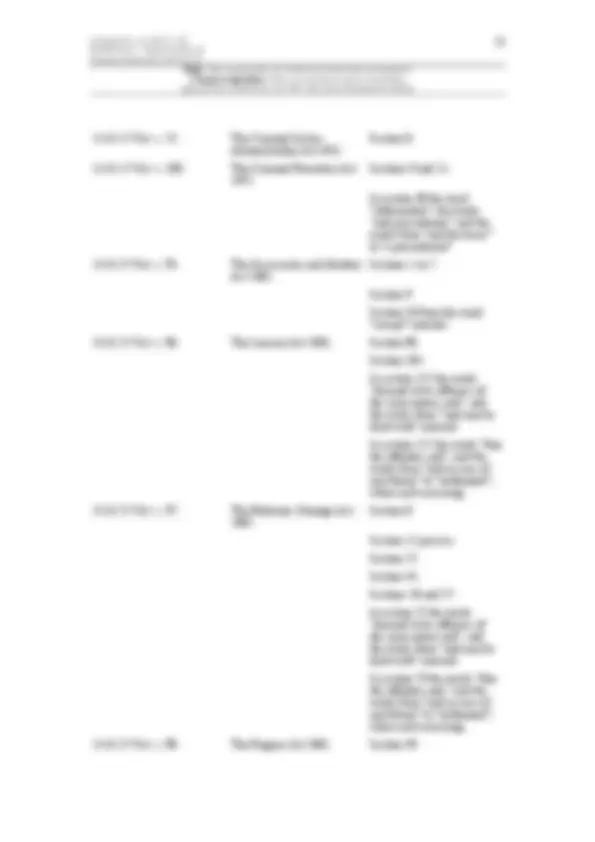
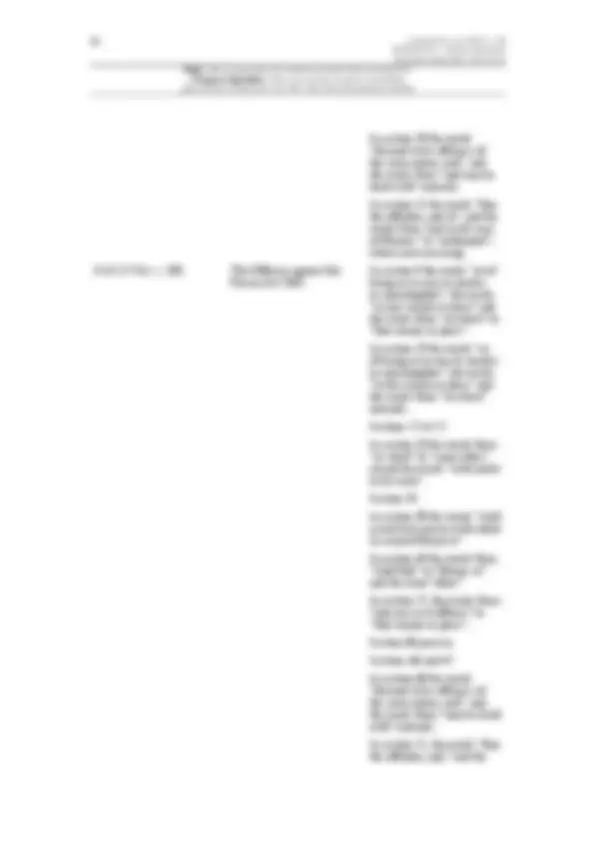
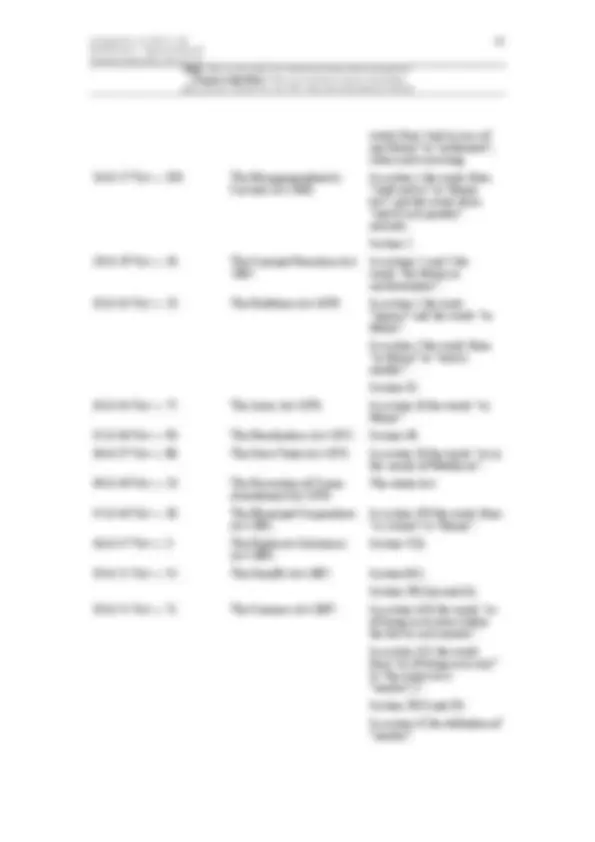
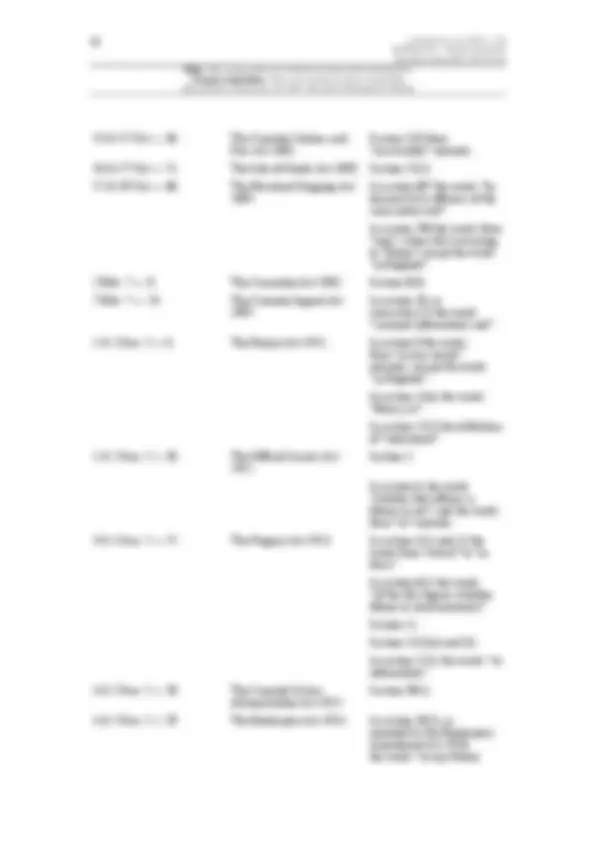
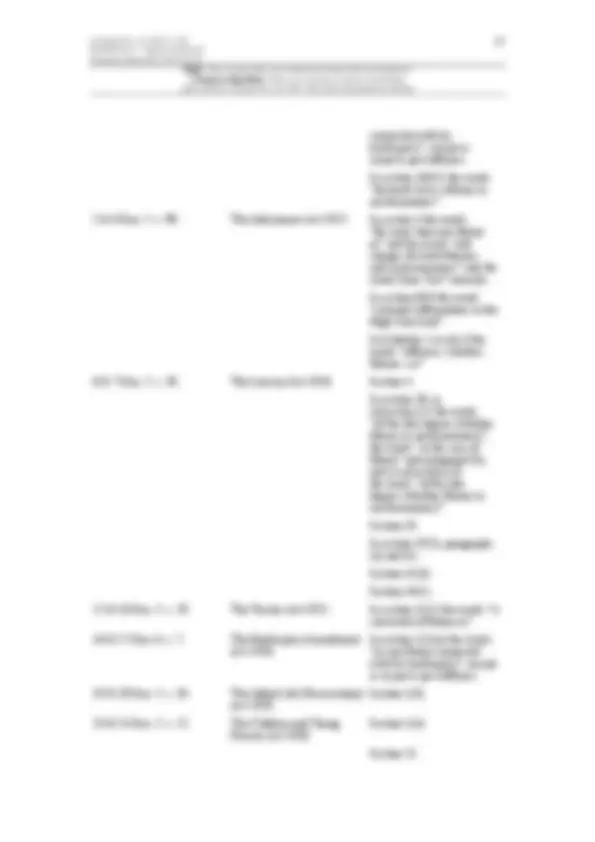
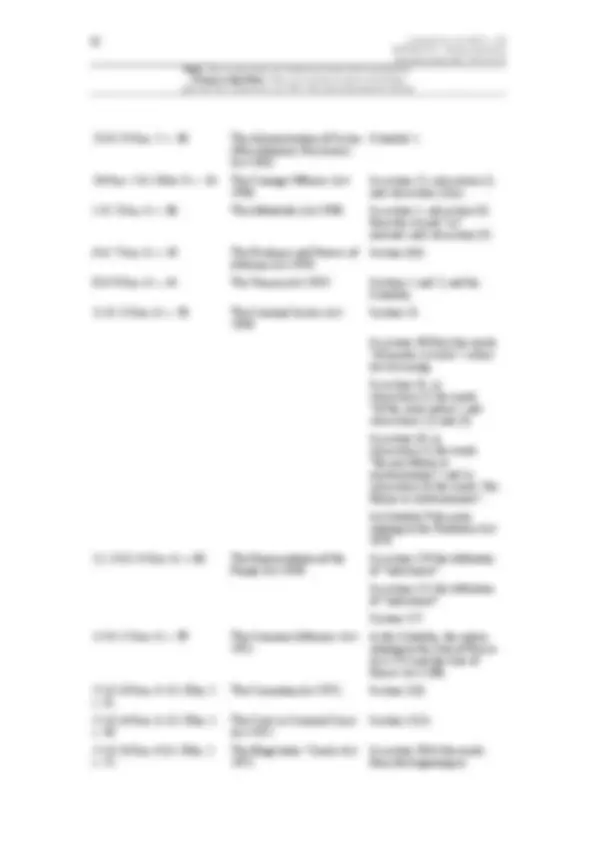
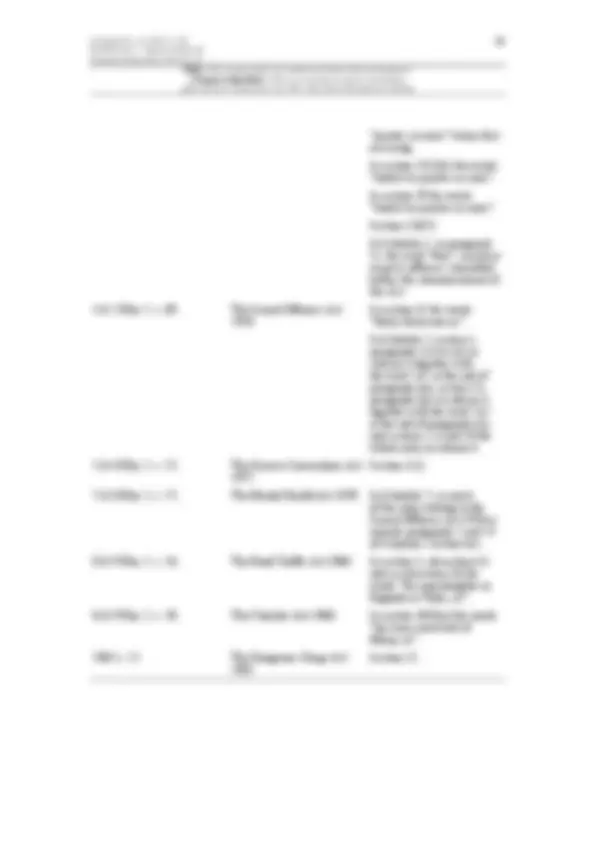
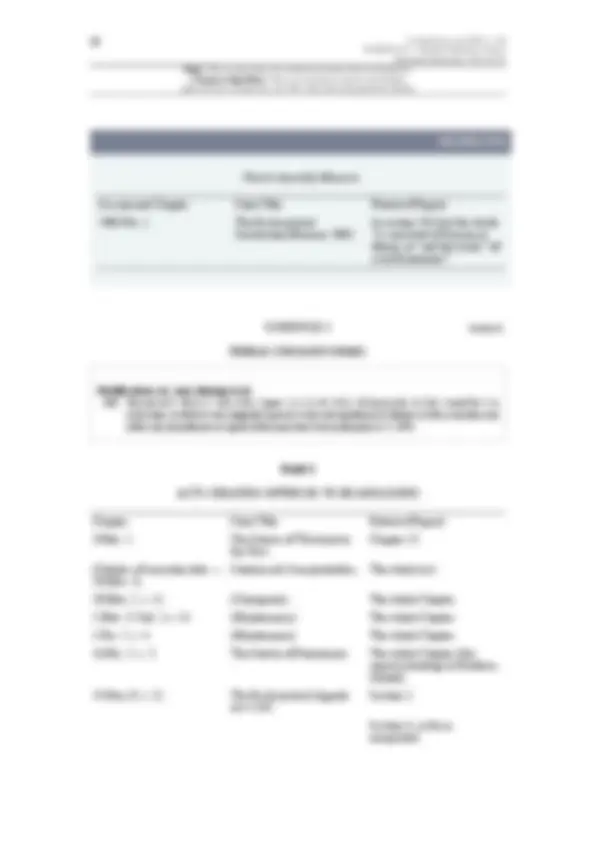

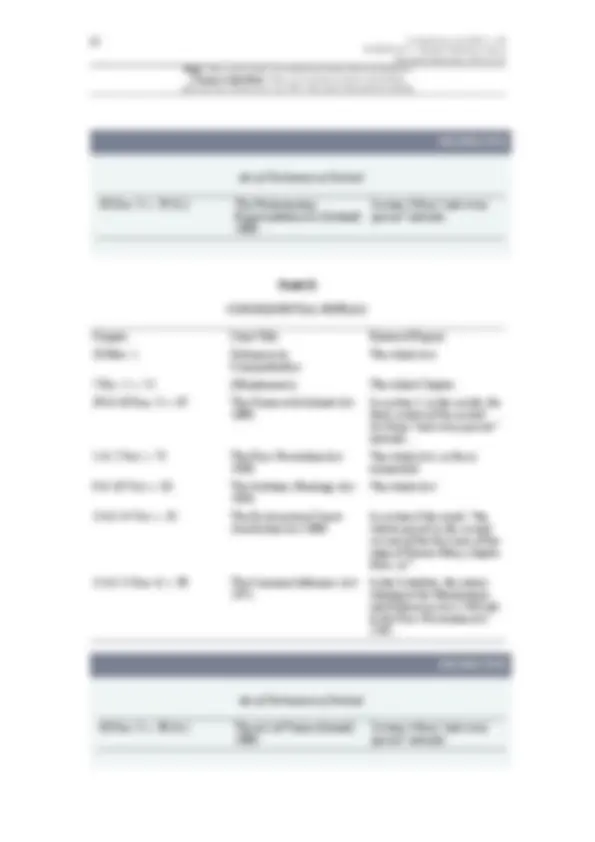
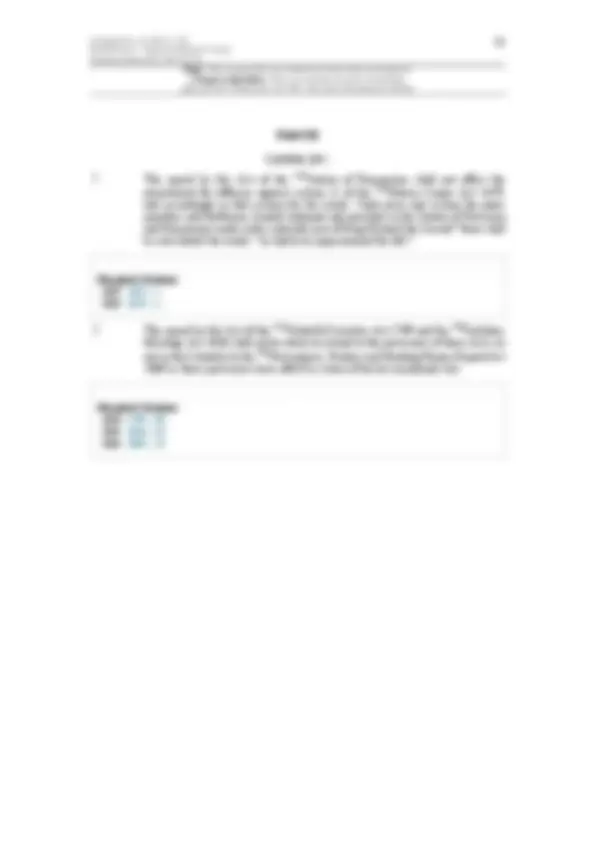



Study with the several resources on Docsity

Earn points by helping other students or get them with a premium plan


Prepare for your exams
Study with the several resources on Docsity

Earn points to download
Earn points by helping other students or get them with a premium plan
Community
Ask the community for help and clear up your study doubts
Discover the best universities in your country according to Docsity users
Free resources
Download our free guides on studying techniques, anxiety management strategies, and thesis advice from Docsity tutors
Various amendments and repeals made to the Criminal Law Act 1967 through different legislations such as the Criminal Justice Act 1982, Magistrates' Courts Act 1980, and the Domestic Violence, Crime and Victims Act 2004. It includes provisions related to the use of force in making arrests, pardon, and offenses under the Larceny Act 1916.
What you will learn
Typology: Study notes
1 / 34

This page cannot be seen from the preview
Don't miss anything!



























Status: This version of this Act contains provisions that are prospective. Changes to legislation: There are currently no known outstanding effects for the Criminal Law Act 1967. (See end of Document for details)
Extent Information E1 Subject to s. 11(2)-(4) this Part shall not extend to Scotland or Northern Ireland see s. 11(1) 1 Abolition of distinction between felony and misdemeanour. (1) All distinctions between felony and misdemeanour are hereby abolished. (2) Subject to the provisions of this Act, on all matters on which a distinction has previously been made between felony and misdemeanour, including mode of trial, the law and practice in relation to all offences cognisable under the law of England and Wales (including piracy) shall be the law and practice applicable at the commencement of this Act in relation to misdemeanour. [F1 2 Arrest without warrant. (1) The powers of summary arrest conferred by the following subsections shall apply to offences for which the sentence is fixed by law or for which a person (not previously convicted) may under or by virtue of any enactment be sentenced to imprisonment for a term of five years [F2 (or might be so sentenced but for the restrictions imposed by [F3 section 33 of the Magistrates’Courts Act 1980) ]] and to attempts to committ any
Part I – Felony and Misdemeanour Document Generated: 2022-01- Status: This version of this Act contains provisions that are prospective. Changes to legislation: There are currently no known outstanding effects for the Criminal Law Act 1967. (See end of Document for details) such offence; and in this Act, including any amendment made by this Act in any other enactment, “arrestable offence” means any such offence or attempt. [F4 The said restrictions are those which apply where, in pursuance of [F5 subsection (2) of section 22 of the said Act of 1980 ] (certain offences to be tried summarily if value involved is small) a magistrates’ court summarily convicts a person of a scheduled offence within the meaning of [F6 the said section 22 ]. ] (2) Any person may arrest without warrant anyone who is, or whom he, with reasonable cause, suspects to be, in the act of committing an arrestable offence. (3) Where an arrestable offence has been committed, any person may arrest without warrant anyone who is, or whom he, with reasonable cause, suspects to be, guilty of the offence. (4) Where a constable, with reasonable cause, suspects that an arrestable offence has been committed, he may arrest without warrant anyone whom he, with reasonable cause, suspects to be guilty of the offence. (5) A constable may arrest without warrant any person who is, or whom he, with reasonable cause, suspects to be, about to commit an arrestable offence. (6) For the purpose of arresting a person under any power conferred by this section a constable may enter (if need be, by force) and search any place where that person is or where the constable, with reasonable cause, suspects him to be. (7) This section shall not... F7^ prejudice any power of arrest conferred by law apart from this section. ] Textual Amendments F1 S. 2 repealed (E.W.) by Police and Criminal Evidence Act 1984 (c. 60, SIF 95), s. 119(2), Sch. 7 Pt. I F2 Words inserted by Criminal Law Act 1977 (c. 45), s. 65(7), Sch. 12 F3 Words substituted by Magistrates' Courts Act 1980 (c. 43, SIF 82), Sch. 7 para. 61 F4 Words added by Criminal Law Act 1977 (c. 45), s. 65(7), Sch. 12 F5 Words substituted by Magistrates' Courts Act 1980 (c. 43, SIF 82), Sch. 7 para. 61 F6 Words substituted by Magistrates' Courts Act 1980 (c. 43, SIF 82), Sch. 7 para. 61 F7 Words repealed by Criminal Jurisdiction Act 1975 (c. 59), Sch. 6 Pt. I Modifications etc. (not altering text) C1 (^) S. 2 extended by Theft Act 1968 (c. 60), s. 12(3) 3 Use of force in making arrest, etc. (1) A person may use such force as is reasonable in the circumstances in the prevention of crime, or in effecting or assisting in the lawful arrest of offenders or suspected offenders or of persons unlawfully at large. (2) Subsection (1) above shall replace the rules of the common law on the question when force used for a purpose mentioned in the subsection is justified by that purpose.
Part I – Felony and Misdemeanour Document Generated: 2022-01- Status: This version of this Act contains provisions that are prospective. Changes to legislation: There are currently no known outstanding effects for the Criminal Law Act 1967. (See end of Document for details) F12 Proviso repealed by Criminal Jurisdiction Act 1975 (c. 59) , Sch. 6 Pt. I F13 Ss. 4(5), 5(4) repealed by Criminal Law Act 1977 (c. 45) , s. 65(5)(7) , Sch. 13 F14 S. 4(6) repealed by Extradition Act 1989 (c. 33, SIF 48) , s. 37 , Sch. 2 F15 S. 4(7) repealed by Theft Act 1968 (c. 60) , Sch. 3 Pt. III Modifications etc. (not altering text) C2 S. 4(1) amended as to mode of trial by Magistrates' Courts Act 1980 (c. 43, SIF 82) , Sch. 1 para. 26 ( a ) 5 Penalties for concealing offences or giving false information. (1) Where a person has committed [F16 a relevant offence ] , any other person who, knowing or believing that the offence or some [F17 other relevant offence ] has been committed, and that he has information which might be of material assistance in securing the prosecution or conviction of an offender for it, accepts or agrees to accept for not disclosing that information any consideration other than the making good of loss or injury caused by the offence, or the making of reasonable compensation for that loss or injury, shall be liable on conviction on indictment to imprisonment for not more that two years. (2) Where a person causes any wasteful employment of the police by knowingly making to any person a false report tending to show that an offence has been committed, or to give rise to apprehension for the safety of any persons or property, or tending to show that he has information material to any police inquiry, he shall be liable on summary conviction to imprisonment for not more than six months or to a fine of not more than [F18 level 4 on the standard scale ] or to both. (3) No proceedings shall be instituted for an offence under this section except by or with the consent of the Director of Public Prosecutions. F19 (4)................................ (5) The compounding of an offence other than treason shall not be an offence otherwise than under this section. Textual Amendments F16 Words in s. 5(1) substituted (1.1.2006) by Serious Organised Crime and Police Act 2005 (c. 15), s. 178(8), Sch. 7 para. 40(3)(a) ; S.I. 2005/3495, art. 2(1)(m) F17 Words in s. 5(1) substituted (1.1.2006) by Serious Organised Crime and Police Act 2005 (c. 15), s. 178(8), Sch. 7 para. 40(3)(b) ; S.I. 2005/3495, art. 2(1)(m) F18 Words substituted by virtue of Criminal Justice Act 1982 (c. 48), ss. 38 , 46 F19 Ss. 4(5), 5(4) repealed by Criminal Law Act 1977 (c. 45), s. 65(5)(7), Sch. 13 Modifications etc. (not altering text) C3 S. 5 restricted (28.7.1998) by 1998 c. 35, s. 14(2)(c) ; S.I. 1998/1858, art.. C4 S. 5(1) amended as to mode of trial by Magistrates' Courts Act 1980 (c. 43, SIF 82), Sch. 1 para. 26 ( b ) 6 Trial of offences. (1) Where a person is arraigned on an indictment—
Part I – Felony and Misdemeanour Document Generated: 2022-01- 5 Status: This version of this Act contains provisions that are prospective. Changes to legislation: There are currently no known outstanding effects for the Criminal Law Act 1967. (See end of Document for details) (a) he shall in all cases be entitled to make a plea of not guilty in addition to any demurrer or special plea; (b) he may plead not guilty of the offence specifically charged in the indictment but guilty of another offence of which he might be found guilty on that indictment; (c) if he stands mute of malice or will not answer directly to the indictment, the court may order a plea of not guilty to be entered on his behalf, and he shall then be treated as having pleaded not guilty. (2) On an indictment for murder a person found not guilty of murder may be found guilty— (a) of manslaughter, or of causing grievous bodily harm with intent to do so; or (b) of any offence of which he may be found guilty under an enactment specifically so providing, or under section 4(2) of this Act; or (c) of an attempt to commit murder, or of an attempt to commit any other offence of which he might be found guilty; but may not be found guilty of any offence not included above. (3) Where, on a person’s trial on indictment for any offence except treason or murder, the jury find him not guilty of the offence specifically charged in the indictment, but the allegations in the indictment amount to or include (expressly or by implication) an allegation of another offence falling within the jurisdiction of the court of trial, the jury may find him guilty of that other offence or of an offence of which he could be found guilty on an indictment specifically charging that other offence. [F20 (3A) For the purposes of subsection (3) above an offence falls within the jurisdiction of the court of trial if it is an offence to which section 40 of the Criminal Justice Act 1988 applies (power to join in indictment count for common assault etc. ), even if a count charging the offence is not included in the indictment. (3B) A person convicted of an offence by virtue of subsection (3A) may only be dealt with for it in a manner in which a magistrates' court could have dealt with him. ] (4) For purposes of subsection (3) above any allegation of an offence shall be taken as including an allegation of attempting to commit that offence; and where a person is charged on indictment with attempting to commit an offence or with any assault or other act preliminary to an offence, but not with the completed offence, then (subject to the discretion of the court to discharge the jury [F21 or otherwise act ] with a view to the preferment of an indictment for the completed offence) he may be convicted of the offence charged notwithstanding that he is shown to be guilty of the completed offence. (5) Where a person arraigned on an indictment pleads not guilty of an offence charged in the indictment but guilty of some other offence of which he might be found guilty on that charge, and he is convicted on that plea of guilty without trial for the offence of which he has pleaded not guilty, then (whether or not the two offences are separately charged in distinct counts) his conviction of the one offence shall be an acquittal of the other. (6) Any power to bring proceedings for an offence by criminal information in the High Court is hereby abolished. (7) Subsections (1) to (3) above shall apply to an indictment containing more than one count as if each count were a separate indictment.
Part I – Felony and Misdemeanour Document Generated: 2022-01- 7 Status: This version of this Act contains provisions that are prospective. Changes to legislation: There are currently no known outstanding effects for the Criminal Law Act 1967. (See end of Document for details) (2) Subsection (1) above shall not restrict the operation of this Part of this Act— (a) in so far as it affects— (i)................................ F F25 (ii)................................ (iii) section 2 of the Forfeiture Act 1870 or any other enactment or rule of law relating to any parliamentary disqualification or other disability or penal consequence arising from an offence being felony; or (b) in so far as (by paragraph 10 of Schedule 2) it amends the M1 Regimental Debts Act 1893. (3)................................ F (4)................................ F Textual Amendments F24 S. 11(2)( a )(i) repealed by Extradition Act 1989 (c. 33, SIF 48), s. 37, Sch. 2 F25 S. 11(2)(a)(ii) repealed (28.3.2009 for specified purposes, 31.10.2009 in so far as not already in force) by Armed Forces Act 2006 (c. 52), s. 383(2), Sch. 17 ; S.I. 2009/812, art. 3(a)(b) (with transitional provisions in S.I. 2009/1059); S.I. 2009/1167, art. 4 F26 S. 11(3) repealed by Public Order Act 1986 (c. 64, SIF 39:2), s. 40(3), Sch. 3 F27 S. 11(4) repealed by Northern Ireland Constitution Act 1973 (c. 36), Sch. 6 Pt. I Marginal Citations M1 (^) 1893 c. 5. 12 Commencement, savings, and other general provisions. (1) This Part of this Act, except in so far as it enlarges the powers of the Parliament of Northern Ireland, shall not come into force until the 1st January 1968; and, in so far as it affects any matter of procedure or evidence or the jurisdiction or powers of any court in relation to offences, it shall have effect in relation to proceedings on indictment for an offence (except as provided by the following subsections) if, but only if, the person charged with the offence is arraigned on or after that day. (2) Where a person is arraigned after the commencement of this Part of this Act on an indictment for a felony committed before that commencement, then for purposes of his trial on that indictment the offence shall be deemed always to have been a misdemeanour and, notwithstanding that the indictment is framed as an indictment for felony, shall be deemed to be charged as a misdemeanour in the indictment. (3) On an indictment signed before the commencement of this Part of this Act, a person may be found guilty of any offence of which he could have been found guilty on that indictment if this Part of this Act had not been passed, but not of any other offence; and a person tried by a court-martial ordered or convened before that commencement may be found guilty of any offence of which he could have been found guilty if this Part of this Act had not been passed, but not of any other offence. (4) Where a person has been tried for or convicted of felony before the commencement of this Part of this Act, the trial or conviction may be proved in any manner in which it could have been proved if this Part of this Act had not been passed.
Part II – Obsolete Crimes Document Generated: 2022-01- Status: This version of this Act contains provisions that are prospective. Changes to legislation: There are currently no known outstanding effects for the Criminal Law Act 1967. (See end of Document for details) (5) Subject to any express amendment or repeal made by this Act, the following provisions shall have effect in relation to any Act passed before this Act:— (a) any enactment creating an offence by directing it to be felony shall be read as directing it to be an offence, and nothing in this Part of this Act shall affect the operation of any reference to an offence in the enactments specially relating to that offence by reason only of the reference being in terms no longer applicable after the commencement of this Part of this Act; (b) any enactment referring to felonious stealing shall be read as referring merely to stealing; (c) nothing in this Part of this Act shall affect the punishment provided for an offence by the enactments specially relating to that offence. (6) In this Part of this Act references to felony shall not be taken as including treason; but the procedure on trials for treason or misprision of treason shall be the same as the procedure as altered by this Act on trials for murder. (7) Any provision of this Part of this Act relating to proceedings on indictment shall, so far as applicable, apply also to proceedings on an inquisition. PART II OBSOLETE CRIMES 13 Abolition of certain offences, and consequential repeals. (1) The following offences are hereby abolished, that is to say— (a) any distinct offence under the common law in England and Wales of maintenance (including champerty, but not embracery), challenging to fight, eavesdropping or being a common barrator, a common scold or a common night walker; and (b) any offence under an enactment mentioned in Part I of Schedule 4 to this Act, to the extent to which the offence depends on any section or part of a section included in the third column of that Schedule. (2) Accordingly the enactments mentioned in Parts I and II of Schedule 4 to this Act are hereby repealed to the extent specified in the third column of the Schedule, but subject to the provisions of Part III of the Schedule. (3) This section shall extend to Northern Ireland only in so far as it relates— (a) to offences under any Act of the Parliament of Ireland; or (b) to offences under any other enactment of which the repeal is in Schedule 4 to this Act expressed to extend to Northern Ireland; and in so far as it repeals any such Act or enactment. Extent Information E2 This section shall extend to Northern Ireland only in accordance with s. 11(3)
SCHEDULE 1 Document Generated: 2022-01- Status: This version of this Act contains provisions that are prospective. Changes to legislation: There are currently no known outstanding effects for the Criminal Law Act 1967. (See end of Document for details) S C H E D U L E S F28F28 SCHEDULE 1 Textual Amendments F28 (^) Sch. 1, Sch. 2 para. 1 repealed by Courts Act 1971 (c. 23), Sch. 11 Pt. IV
................................ F SCHEDULE 2 Section 10. SUPPLEMENTARY AMENDMENTS Adaptations of enactments referring to felony (^1)................................ F Textual Amendments F29 Sch. 1, Sch. 2 para. 1 repealed by Courts Act 1971 (c. 23), Sch. 11 Pt. IV (^2)................................ F Textual Amendments F30 Sch. 2 para. 2 repealed by Criminal Attempts Act 1981 (c. 47), Sch. Pt. II and by Public Order Act 1986 (c. 64, SIF 39:2), s. 40(3), Sch. 3 3 (1) (^) In section 28 of the M2 Criminal Law Act 1826 (which enables assize courts and, as extended by section 8 of the M3 Criminal Justice Administration Act 1851, courts of quarter sessions to award compensation to those active in apprehending persons charged with murder and certain other offences)— (a) for the words “superior criminal court of a county palatine or court of great sessions” there shall be substituted the words “or quarter sessions”, and accordingly there shall be omitted the words from “and where any person shall appear to any court of sessions of the peace” to “other courts hereinbefore mentioned”; and (b) for the words from “murder” to “been stolen” there shall be substituted the words “an arrestable offence” and for the words “any of the said offences” there shall be substituted the words “that offence”.
SCHEDULE 2 – Supplementary Amendments Document Generated: 2022-01- 11 Status: This version of this Act contains provisions that are prospective. Changes to legislation: There are currently no known outstanding effects for the Criminal Law Act 1967. (See end of Document for details) (2) (^) In section 30 of the M4 Criminal Law Act 1826 (which enables compensation to be awarded to the family of anyone killed in trying to apprehend a person charged with an offence mentioned in section 28) for the words “any of the offences hereinbefore last mentioned” there shall be substituted the words “an arrestable offence”. Modifications etc. (not altering text) C7 (^) The text of S. 10(2), S. 13(2), Sch. 2 paras. 3, 4, 6, 10, 12(2), 13(1)( a )( c )( d ), 14, Sch. 3 and Sch. 4 is in the form in which it was originally enacted: it was not reproduced in Statutes in Force and does not reflect any amendments or repeals which may have been made prior to 1.2.1991. Marginal Citations M2 1826 c. 64 M3 1851 c. 55 M4 1826 c. 64. (^4) In section 8 of the M5 Carriers Act 1830 (under which the protection given by that Act to common carriers does not extend to the felonious acts of their servants) for the words “the felonious acts” there shall be substituted the words “any theft, embezzlement or forgery”. Modifications etc. (not altering text) C8 The text of S. 10(2), S. 13(2), Sch. 2 paras. 3, 4, 6, 10, 12(2), 13(1)( a )( c )( d ), 14, Sch. 3 and Sch. 4 is in the form in which it was originally enacted: it was not reproduced in Statutes in Force and does not reflect any amendments or repeals which may have been made prior to 1.2.1991. Marginal Citations M5 1830 c. 68. 5 In the following enactments (which confer on the police powers of entry into vessels on suspicion of felony), that is to say,— (a) (^) section 34 of the M6 Metropolitan Police Act 1839; (b) (^) section 9 of the M7 Canals (Offences) Act 1840; for the expressions “felony” and “felonies” there shall be substituted the expressions “arrestable offence” and “arrestable offences”; and any enactment for the same or like purposes which is contained in any local or private Act shall be modified as near as may be in the same way. Marginal Citations M6 1839 c. 47. M7 1840 c. 50. 6 In the following enactments (which provide for the trial of murder or manslaughter where any person dies in a country after being feloniously stricken out of it or vice versa), that is to say,— (a) (^) section 3 of the M8 Admiralty Offences (Colonial) Act 1849; (b) (^) section 1 of the M9 Admiralty Offences (Colonial) Act 1860;
SCHEDULE 2 – Supplementary Amendments Document Generated: 2022-01- 13 Status: This version of this Act contains provisions that are prospective. Changes to legislation: There are currently no known outstanding effects for the Criminal Law Act 1967. (See end of Document for details) a court of ordinary criminal jurisdiction, is sentenced to death or is imprisoned or detained to serve a sentence of three months or more”. Modifications etc. (not altering text) C10 The text of S. 10(2), S. 13(2), Sch. 2 paras. 3, 4, 6, 10, 12(2), 13(1)( a )( c )( d ), 14, Sch. 3 and Sch. 4 is in the form in which it was originally enacted: it was not reproduced in Statutes in Force and does not reflect any amendments or repeals which may have been made prior to 1.2.1991. Marginal Citations M12 (^) 1893 c. 5. (^11)................................ F Textual Amendments F35 (^) Sch. 2 para. 11 repealed by Forgery and Counterfeiting Act 1981 (c. 45, SIF 39:7), Sch. 1 Pt. I 12 (1) (^)................................ F (2) A person guilty of any offence under section 33(1) of the Larceny Act 1916 (receiving) shall be liable to imprisonment for a term not exceeding fourteen years; but— (a) (^) in the M13 Bankruptcy Act 1914, in section 154(3) (which was added by the M14 Bankruptcy Amendment Act 1926, and in certain cases makes a person receiving property fraudulently disposed of by a bankrupt liable to the same punishment as a receiver of property obtained by a misdemeanour), for the words following the word “liable” there shall be substituted the words “on conviction on indictment to imprisonment for not more than seven years or on summary conviction to imprisonment for a term not exceeding six months or to a fine not exceeding a hundred pounds or to both”; and (b) (^) in the M15 Companies Act 1948, in section 328(2), there shall be omitted paragraph (a) and in paragraph (b) the words “in Scotland”. (3) (^)................................ F (6) Nothing in this Act shall affect the punishment provided by section 33 of the M16 Larceny Act 1916 for offences committed before the commencement of Part I of this Act. Textual Amendments F36 Sch. 2 para. 12 (1) repealed by Theft Act 1968 (c. 60), Sch. Pt. III F37 Sch. 2 para. 12(3)–(5) repealed by Theft Act 1968 (c. 60), Sch. Pt. III Modifications etc. (not altering text) C11 The text of S. 10(2), S. 13(2), Sch. 2 paras. 3, 4, 6, 10, 12(2), 13(1)( a )( c )( d ), 14, Sch. 3 and Sch. 4 is in the form in which it was originally enacted: it was not reproduced in Statutes in Force and does not reflect any amendments or repeals which may have been made prior to 1.2.1991.
SCHEDULE 2 – Supplementary Amendments Document Generated: 2022-01- Status: This version of this Act contains provisions that are prospective. Changes to legislation: There are currently no known outstanding effects for the Criminal Law Act 1967. (See end of Document for details) Marginal Citations M13 1914 c. 59. M14 1926 c. 7. M15 1916 c. 50. M16 1916 c. 50. 13 (1) The following provisions (under which on a trial on indictment a person may be found guilty of certain offences if found not guilty on a charge of another offence) shall cease to have effect:— (a) (^) in the M17 Offences against the Person Act 1861, section 60 proviso as extended by any subsequent enactment (conviction of concealment of birth on charge of murder, child destruction or infanticide); (b) (^)................................ F (c) (^) in the M18 Children and Young Persons Act 1933, section 1(4) (conviction of cruelty to person under 16 on charge of infanticide or, in certain cases, of manslaughter); (d) (^) in the M19 Sexual Offences Act 1956, in Schedlule 2,— (i) in item 1(a), paragraphs (iv), (v), (vi) and (viii) in column 4 (conviction of intercourse with girl under 13, or under 16, or with defective, or of incest, on charge of rape); (ii) in item 2(a) the whole entry in column 4 (conviction of procuring intercourse by threats, by false pretences or by administering drugs, or of intercourse with girl under 16, or with defective, on charge of intercourse with girl under 13); (iii) in items 6 and 26 the whole entry in column 4 (conviction of permitting person under 16 to reside in or frequent a brothel on charge of allowing girl under 13, or under 16, to use premises for intercourse); (iv) in item 14(a) paragraph (iii) in column 4 (conviction of intercourse with defective on charge of incest); (e) (^)................................ F (2) (^)................................ F Textual Amendments F38 Sch. 2 para. 13(1)( b ) repealed by Theft Act 1968 (c. 60), Sch. Pt. III F39 Sch. 2 para. 13(1)( e )(2) repealed by Road Traffic Act 1972 (c. 20), Sch. 9 Pt. I Modifications etc. (not altering text) C12 The text of S. 10(2), S. 13(2), Sch. 2 paras. 3, 4, 6, 10, 12(2), 13(1)(a)(c)(d), 14, Sch. 3 and Sch. 4 is in the form in which it was originally enacted: it was not reproduced in Statutes in Force and does not reflect any amendments or repeals which may have been made prior to 1.2.1991. Marginal Citations M17 1861 c. 100. M18 1933 c. 12. M19 1956 c. 69.
SCHEDULE 3 – Repeals (General) Document Generated: 2022-01- Status: This version of this Act contains provisions that are prospective. Changes to legislation: There are currently no known outstanding effects for the Criminal Law Act 1967. (See end of Document for details) PART I REPEALS OF OBSOLETE OR UNNECESSARY ENACTMENTS Session and Chapter Title or Short Title Extent of Repeal 3 Edw. 1. The Statute of Westminster the First. Chapters 6 and 28. 25 Edw. 1. The Great Charter. Article 14. 2 Edw. 3. c. 3. The Statute of Northampton. The whole Chapter. 18 Edw. 3. Stat. 3. c.1 (Exemption for the prelates in criminal cases). The whole Chapter. 25 Edw. 3. c. 3. Stat. 5. The Treason Act 1351. From “Et si per cas” onwards. 15 Ric. 2. c. 3. The Admiralty Jurisdiction Act 1391. The whole Chapter, so far as unrepealed. 17 Ric. 2. c. 8. (Riots). The whole Chapter. 13 Hen. 4. c. 7. The Riot Act 1411. The whole Chapter, so far as unrepealed. 2 Hen. 5. Stat. 1. c.8. The Riot Act 1414. The whole Chapter, so far as unrepealed. 27 Hen. 8. c. 24. The Jurisdiction in Liberties Act 1535. The preamble and section 1. 28 Hen. 8. c. 15. The Offences at Sea Act
The whole Act. 33 Hen. 8. c. 12. The Offences within the Court Act 1541. The whole Act. 35 Hen. 8. c. 2. The Treason Act 1543. The whole Act. 1 Edw. 6. c. 1. The Sacrament Act 1547. Sections 2, 4, 5 and 7. 1 Edw. 6. c. 7. The Justices of the Peace Act
Section 5 to the words “continued in full force and strength”. 2 & 3 Edw. 6. c. 1. The Act of Uniformity 1548. Section 11. 1 Mary Sess. 1. c. 1. The Treason Act 1553. The whole Act. 1 & 2 Phil. & Mar. c. 10 The Treason Act 1554. The whole Act. 2 & 3 Phil. & Mar. c. 7. The Sale of Horses Act 1555. The whole Act. 1 Eliz. 1. c. 1. The Act of Supremacy. Section 15. 1 Eliz. 1. c. 2. The Act of Uniformity 1558. Section 10. 13 Eliz. 1. c. 2. An Act against the bringing in and putting in execution of Bulls and other instruments from the See of Rome. Section 8.
SCHEDULE 3 – Repeals (General) Document Generated: 2022-01- 17 Status: This version of this Act contains provisions that are prospective. Changes to legislation: There are currently no known outstanding effects for the Criminal Law Act 1967. (See end of Document for details) 31 Eliz. 1. c. 12. The Sale of Horses Act 1588. The whole Act. 13 Chas. 2. Stat. 1. c. 5. The Tumultuous Petitioning Act 1661. In section 1, the words from “at the Court” to “quarter sessions”. 7 Anne c. 21. The Treason Act 1708. Section 7. 4 Geo. 1. c. 11. The Piracy Act 1717. Section 7. 8 Geo. 1. c. 24. The Piracy Act 1721. In section 1, the words from “and he” to “suppressing of piracy”. Section 3. 16 Geo. 2. c. 31. The Prison (Escape) Act
The whole Act so far as unrepealed. 18 Geo. 2. c. 30 The Piracy Act 1744. The whole Act. 20 Geo. 2. c. 30. The Treason Act 1746. The whole Act. 33 Geo. 3. c. 67. The Shipping Offences Act
In section 1, the words from “to be found” to “committed” where next occurring. 33 Geo. 3. c. 67 The Shipping Offences Act
In section 1, the words from “to be found” to “committed” where next occurring. In section 3, the words from “to be found” to “committed”. Section 7. 39 Geo. 3. c. 37. The Offences at Sea Act
The Preamble. In section 1, the words “of the same nature respectively, and to be” and the words from “and shall be inquired of” onwards. Section 2. 46 Geo. 3. c. 54. The Offences at Sea Act
The whole Act. 49 Geo. 3. c. 126. The Sale of Offices Act 1809. In section 14, the words “in His Majesty’s Court of King’s Bench at Westminster”. 56 Geo. 3. c. 138. The Pillory Abolition Act
Section 2. 57 Geo. 3. c. 53. The Murders Abroad Act
The whole Act, so far as unrepealed.
SCHEDULE 3 – Repeals (General) Document Generated: 2022-01- 19 Status: This version of this Act contains provisions that are prospective. Changes to legislation: There are currently no known outstanding effects for the Criminal Law Act 1967. (See end of Document for details) 1 Edw. 8. & 1 Geo. 6. c. 12. The Firearms Act 1937. In Schedule 3, the entry for offences under the 3rd and 4th paragraphs of section 7 of the Prevention of Crimes Act
1 & 2 Geo. 6. c. 63. The Administration of Justice (Miscellaneous Provisions) Act 1938. Section 12. 3 & 4 Geo. 6. c. 21. The Treachery Act 1940. The whole Act. 11 & 12 Geo. 6. c. 58. The Criminal Justice Act
Section 30. PART II REPEALS RELATING TO JURISDICTION OF QUARTER SESSIONS Session and Chapter Title or Short Title Extent of Repeal 34 Edw. 3. c. 1. The Justices of the Peace Act
From “et auxint doier et terminer” onwards. 5 & 6 Vict. c. 38. The Quarter Sessions Act
Section 1. 14 & 15 Vict. c. 55. The Criminal Justice Administration Act 1851. Section 13. 24 & 25 Vict. c. 96. The Larceny Act 1861. Section 87. 32 & 33 Vict. c. 62. The Debtors Act 1869. Section 20. 37 & 38 Vict. c. 36. The False Personation Act
Section 3. 52 & 53 Vict. c. 69. The Public Bodies Corrupt Practices Act 1889. Section 6. 6 Edw. 7. c. 34. The Prevention of Corruption Act 1906. Section 2(5). 1 & 2 Geo. 5. c. 6. The Perjury Act 1911. Section 10. 1 & 2 Geo. 5. c. 28. The Official Secrets Act
In section 10(3) the words “by any court of general or quarter sessions nor”. 3 & 4 Geo. 5. c. 27. The Forgery Act 1913. Section 13. 6 & 7 Geo. 5. c. 50. The Larceny Act 1916. Section 38(1). 15 & 16 Geo. 5. c. 86. The Criminal Justice Act
Section 18. Schedule 1. 19 & 20 Geo. 5. c. 34. The Infant Life (Preservation) Act 1929. Section 2(1).
SCHEDULE 3 – Repeals (General) Document Generated: 2022-01- Status: This version of this Act contains provisions that are prospective. Changes to legislation: There are currently no known outstanding effects for the Criminal Law Act 1967. (See end of Document for details) 1 & 2 Geo. 6. c. 63. The Administration of Justice (Miscellaneous Provisions) Act 1938. In section 2, subsection (1), subsection (2)(f), in subsection (5) the words “in the First Schedule to this Act” and the proviso, and subsection (6). Schedule 1. 12, 13 & 14 Geo. 6. c. 68. The Representation of the People Act 1949. Section 146(1) proviso (a). 4 & 5 Eliz. 2. c. 34. The Criminal Justice Administration Act 1956. Section 12. 4 & 5 Eliz. 2. c. 69. The Sexual Offences Act
In Schedule 3 the entry amending the Administration of Justice (Miscellaneous Provisions) Act 1938. 8 & 9 Eliz. 2. c. 16. The Road Traffic Act 1960. Section 1(2) from the beginning to the word “and”. 9 & 10 Eliz. 2. c. 60. The Suicide Act 1961. Section 2(4) from the beginning to the word “and”. 10 & 11 Eliz. 2. c. 15. The Criminal Justice Administration Act 1962. Section 12(1) and (2). Schedule 2. In Schedule 4 in Part II the entries amending the Administration of Justice (Miscellaneous Provisions) Act 1938. 1964 c. 42. The Administration of Justice Act 1964. In section 7(3) the words from “section 2” to “and of”. In Schedule 3, in paragraph 17(2), the words “and 2(5)”. PART III OTHER GENERAL REPEALS Session and Chapter Title or Short Title Extent of Repeal 2 & 3 Edw. 6. c. 1. The Act of Uniformity 1548. In section 3, the words from “forfeit to our” to “and shall”. 31 Chas. 2. c. 2. The Habeas Corpus Act
In section 1 the words “or felony”. In section 2 the words “or felony”.